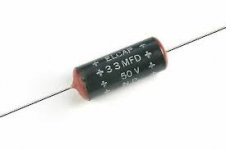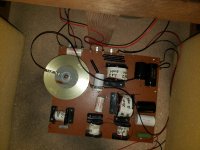An externally hosted image should be here but it was not working when we last tested it.
An externally hosted image should be here but it was not working when we last tested it.
I'm doing a cap replacement on 4 wharfedale airedale sp speaker crossovers.I would like to change all the caps with film caps.there are 7 caps per board and I don't want to go broke or over spend on the quality.I hope you can give me a little guidance and tell me if I should change the resistors as well. thank you for any help. Scott
If the capacitors don't have a voltage "NP" after the capacitance, they are not electrolytic capacitors. electrolytics are aluminum bottles, filled with aluminum foil etched by chemical slime. the water in the slime evaporates through the elastomeric seal. There were two brands of epoxy sealed caps that did not leak, and the only consumer product known to contain one of them was the Fender amp with green CDE caps of the seventies.
Plastic film caps except for certain notorious early brands, do not deteriorate. One such brand made in France about 1966 was SCR.
Resistors involve no water, no rubber seal, and unless overheated, do not deteriorate. Carbon composition resistors that were not paint sealed against moisture would deteriorate from moisture. The production of these stopped about 1980. The paint became common in the AB & Sprague carbon comp resistors used in the US in premium brands (HH Scott, dynaco) after 1960.
The voltage that you need to have caps rated at depend on the watts rating of the speakers and the amplifier. Amps smaller than 600 w/ch typically produce less than 100 volts, and caps rated at 100 volts is adequate. Most homeowners have amps rated <100 w/ch or 28 v.
From parts-express I'm buying film caps made by "dayton" which is parts-express, and audin. Few speaker sized capacitors are stocked at general electronics parts distributors. The caps commonly stocked at parts-express are 250 vac rated. This doesn't hurt but makes them very big. Outside the USA do not use parts-express. The most non-distorting plastic for caps, according to John Curl, is polyprophylene. Polyester caps will work, but not be as sonically transparent.
Plastic film caps except for certain notorious early brands, do not deteriorate. One such brand made in France about 1966 was SCR.
Resistors involve no water, no rubber seal, and unless overheated, do not deteriorate. Carbon composition resistors that were not paint sealed against moisture would deteriorate from moisture. The production of these stopped about 1980. The paint became common in the AB & Sprague carbon comp resistors used in the US in premium brands (HH Scott, dynaco) after 1960.
The voltage that you need to have caps rated at depend on the watts rating of the speakers and the amplifier. Amps smaller than 600 w/ch typically produce less than 100 volts, and caps rated at 100 volts is adequate. Most homeowners have amps rated <100 w/ch or 28 v.
From parts-express I'm buying film caps made by "dayton" which is parts-express, and audin. Few speaker sized capacitors are stocked at general electronics parts distributors. The caps commonly stocked at parts-express are 250 vac rated. This doesn't hurt but makes them very big. Outside the USA do not use parts-express. The most non-distorting plastic for caps, according to John Curl, is polyprophylene. Polyester caps will work, but not be as sonically transparent.
Last edited:
Hi Scott!
The capacitors fitted are ELCAP bipolar electrolytic capacitors (as in attached image).
These do not age well and should be replaced as a matter of course.
To preserve the original character of the loudspeakers, you may wish to consider replacing them with modern bipolar (NP) electrolytic capacitors like the ones linked to here: Mundorf Electrolytic ECap Capacitors
Fitting seven, much larger film capacitors onto the crossover board may be problematical, so check their dimensions carefully before ordering film types.
The capacitors fitted are ELCAP bipolar electrolytic capacitors (as in attached image).
These do not age well and should be replaced as a matter of course.
To preserve the original character of the loudspeakers, you may wish to consider replacing them with modern bipolar (NP) electrolytic capacitors like the ones linked to here: Mundorf Electrolytic ECap Capacitors
Fitting seven, much larger film capacitors onto the crossover board may be problematical, so check their dimensions carefully before ordering film types.
Attachments
P.S. It is not necessary to change the resistors unless they show signs of overheating. You can check their resistances are OK using a multimeter.
On the other hand, there's nothing to stop you doing so provided you take the physical size of the replacements into account.
On the other hand, there's nothing to stop you doing so provided you take the physical size of the replacements into account.
thank you Galu and indianajo for the information .I will take your advise and look for the Mundorf.
what do you think about these choices.thanks for the help
mcap 250
6.8uf replaces 6 mfd
8.2uf replaces 8 mfd
ecap70
33uf replaces 32 mfd
47uf replaces 50 mfd
mcap 250
6.8uf replaces 6 mfd
8.2uf replaces 8 mfd
ecap70
33uf replaces 32 mfd
47uf replaces 50 mfd
Good matching!
The modern values are within the tolerance range of the original ELCAPs.
Your Airedale's will be revitalised to such an extent that you can expect an improved tonal balance, to which you may need a short time to adapt.
Wish I could listen to them!
The modern values are within the tolerance range of the original ELCAPs.
Your Airedale's will be revitalised to such an extent that you can expect an improved tonal balance, to which you may need a short time to adapt.
Wish I could listen to them!
thank Galu. my main worry was the 6mfd to 6.8 uf for the tweeters.I will get them in the morning and have my music back in the afternoon. ..Scott
Yes, that's the only one that is more than 10% out, but I have read the the tolerance of the ELCAPs was only 20%.
Anyhow, the difference is so small in the context of this crossover circuit to make no audible difference in itself.
Anyhow, the difference is so small in the context of this crossover circuit to make no audible difference in itself.
Dayton Audio make more values of capacitors so you can get closer matches. Also film capacitors would be better choices where they are affordable and there's space to fit them. Here's a 6.2µF film cap that's quite cheap:

Dayton Audio DMPC-6.2 6.2uF 250V Polypropylene Capacitor

Dayton Audio DMPC-6.2 6.2uF 250V Polypropylene Capacitor
well job completed and the difference is huge.I also found that my right mid speaker was not connected properly.go figure. anyway I'm listening to a couple of hundred flac songs I have and the quality makes me want to keep listening..a very good sign.thank you for all the advice...Scott
An externally hosted image should be here but it was not working when we last tested it.
completed crossover pictureNice work!
I see you used electrolytics for the three large value caps, and film for the smaller values - a sensible combination
I see you used electrolytics for the three large value caps, and film for the smaller values - a sensible combination
good eye Galu. I tried to keep the cost down as I had 4 crossover to redo.the end cost was $70.00 per speaker .....affordable as money is tight these days.thanks to all for the guidance....Scott
My curiosity is piqued!
May I ask how you were lucky enough to come by four Wharfedale Airedale speakers?
An externally hosted image should be here but it was not working when we last tested it.
May I ask how you were lucky enough to come by four Wharfedale Airedale speakers?
these are airdale sp speakers
An externally hosted image should be here but it was not working when we last tested it.
Imgur: The magic of the Internet
Last edited:
- Home
- Design & Build
- Parts
- crossover rebuild


